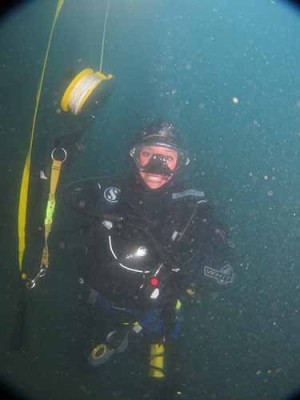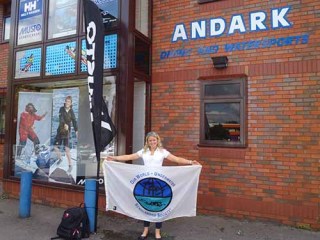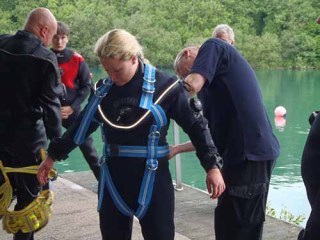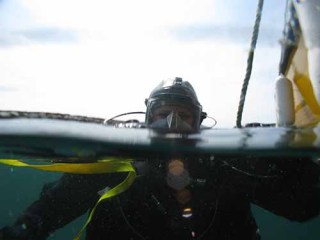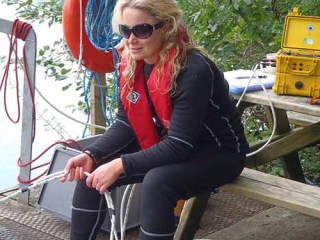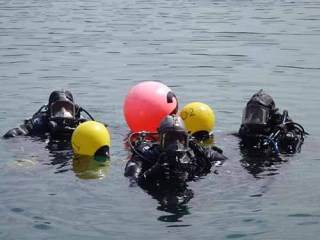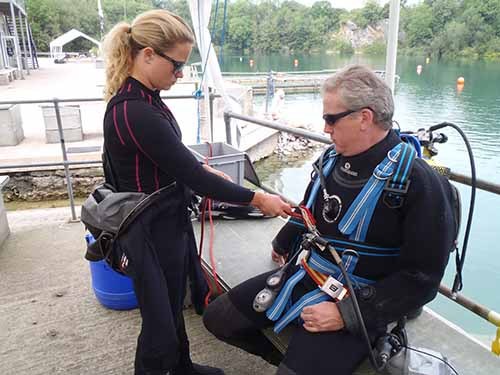Commercial diving: hardy, manly, tough. Tick tick tick. But it is a whole lot more – as I found out in the latter part of July when I embarked on my Health and Safety Executive (HSE) Scuba course with Andark Diving and Watersports, near Southampton, UK.
A number of people had mentioned the HSE Scuba course as being a worthwhile and useful one to do and I was fortunate enough for Andy Goddard to offer me a place on the Andark course. The majority of people looking to complete this course do so as a starting point to becoming a commercial diver. My motive, however, is related to scientific and media work. Being employed as a diver in these fields within the UK, or with a UK organization/company will often require this qualification, and in many circumstances it is compulsory. In addition I feel it will be very useful in terms of having the qualifications to make the most of my scholarship year.
Despite not intending to become a hardened commercial diver I can’t help but feel I am half way there after completing the course! I spent 10 days learning how to think and dive like a commercial diver. It is very different. Dives are run by a supervisor who determines each aspect of the dive. You are just the puppet at the end of the line – or as my instructors Jeff and Marc liked to call it: “a dope on a rope!”. I certainly lived up to the dope tag on frequent occasions. Well, you need some laughs when you’re completing a course. I just happened to provide the majority!
I learned a huge amount during my 10 day course with Andark: not only did I learn how to dive commercially using a full face mask, a lifeline and underwater communications I also learned how to be a tender and a standby diver. I learned more about seamanship; decompression tables; compressors; safety standards and equipment than in any other course I have done. What’s more to embark on the course you have to complete a number of pre-requisites. These include a first-aid course, a chamber assistant course and a dive medical. I completed my first aid at work course with Andark, whilst my medical and chamber course were done through the London Diving Chamber.
What I love about this scholarship is the opportunity to push the boundaries and really explore the world of diving beyond the realms of recreational diving and beyond the realms of anything you could have experienced otherwise. I feel I have grown as a diver and a person on account of my experiences on the HSE Scuba course and I am very pleased I took it on. Having met some commercial divers in Mozambique last summer I had a vague idea of what was involved.
I knew the niceties were very much done away with – you are there to do a job, not have a jolly. There is none of the PADI happy diver mentality on this course.
I knew full-face masks were used. I hated this at first – but like most diving experiences the first dive when you are trying something new tends to be unpleasant. By the end of the course using the mask became second nature. Indeed I became so used to diving with it I was surprised when I did see an ordinary second stage hanging over my right shoulder when we went back onto regular scuba gear! What is that for again?
I knew you could speak through the full-face mask. I managed this, and the official communication jargon – most of the time. “Can you slacken my life line a wee bit please, thanks” wasn’t quite right… Politeness is high on the list of priorities in commercial diving, but time is money at the end of the day and communications need to be precise and effective.
I knew you were attached to lines on the surface. I learnt how to communicate through these lines effectively and how useful they can be in an emergency situation. Having someone on the surface to pull on a lifeline allows a controlled emergency ascent and negates the risk of a second bent rescue diver. I also learnt these lines are not in fact used to pull you up at the end of the dive – you still have to swim up. The dope on a rope analogy didn’t extend that far, which caused me a little confusion…
Commercial divers do not dive primarily for pleasure, it is a means to get a job done; a tool. Nevertheless my course did involve humour, fun and enjoyment and I believe this is a testament to the team at Andark.
